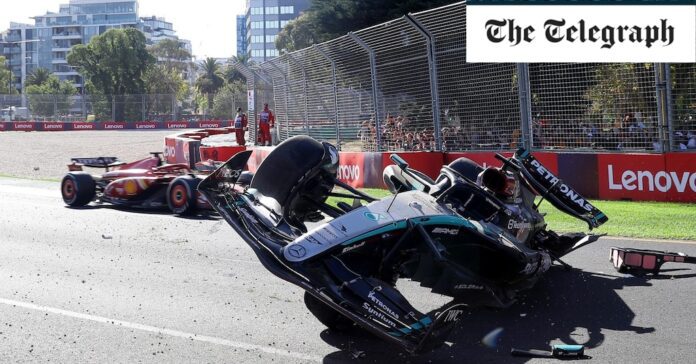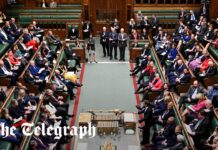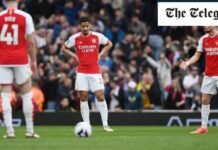[ad_1]

Russell’s frantic pleas to stop the race fell on deaf ears though, with the race director waiting more than 10 seconds after his Mercedes came to a standstill before deploying the Virtual Safety Car instead – which reduces speeds to between 30 and 40 per cent of full race pace.
“Why so long?” Russell asked on his radio as team principal Toto Wolff checked in on his condition. “[It’s] too long. I’m OK, I’m in the middle of the track, the car’s upside down.”
The crash ended a miserable weekend for Mercedes, as Lewis Hamilton – who is now enduring his worst start to a Formula One season – retired with engine failure on lap 17, having been running ninth, and Wolff said it was “fair” to ask whether he was still the right man to lead Mercedes after neither of his drivers finished and the team were left bewildered as to their fluctuating form.
After a winter in which they completely changed their car’s underlying philosophy in a bid to establish a more consistent baseline, Mercedes are now looking at a third-straight year of playing catch-up.
Wolff said the team were at a loss to explain why their car performed in certain conditions and not in others. “What we see in the tunnel doesn’t correlate to what we see on the track,” he admitted.
‘We have not swallowed a dumb pill since 2021’
Asked whether he still felt he was the right man to lead, Wolff added: “I would be the first one to say [if he felt someone was better placed]. If somebody has a better idea, tell me because I am invested to turn this team around as quickly as possible.
“But we have a physics problem, not a philosophical or organisational problem. We have not swallowed a dumb pill since 2021. We don’t understand some of the behaviours of the car and in the past we would.
“I look at myself in the mirror every single day about everything I do and if I believe I should ask the manager question or the trainer question. It is a fair question but it is not what I feel at the moment that I should do.”
Wolff, who is co-owner and chief executive of Mercedes F1, as well as team principal, signed a new three-year contract in January, shortly before Hamilton told him he was defecting to Ferrari next season.
He added: “The big difference is, this is my job and I [can’t just] stop and go to Chelsea or Liverpool or over to Ferrari. I have not got that choice which is also unfortunate. I am not a contractor or an employee who can say ‘I have had enough of this’. My hamster wheel keeps spinning and I cannot jump out.
“We always need to look at ourselves. I need to look at myself. We are all humans. Data don’t take decisions, humans do.”
This race was just what the doctor ordered. Or at least the neutral. A wild Australian Grand Prix ended in controversy, with Fernando Alonso handed a 20-second penalty post-race for causing George Russell to crash spectacularly on the penultimate lap. The Englishman was left suspended, nearly upside-down, in the middle of the Albert Park circuit, after clipping the barriers at turn six. Fortunately, he emerged unhurt from his wreckage.
Crucially, it also ended without a Red Bull winning. Max Verstappen’s hopes of wrapping up what would have been a record-equalling 10th consecutive victory – and a hat-trick of wins this season – went up in flames on lap four when his brakes caught fire. The Dutchman’s first retirement in 43 races allowed Carlos Sainz, only just out of hospital after having his appendix removed, to lead team-mate Charles Leclerc home in a Ferrari one-two, with McLaren’s Lando Norris third.
Ferrari’s unbounded joy at the finish was matched only by Mercedes’ misery. Lewis Hamilton, like his team-mate, also failed to reach the finish, retiring with engine failure on lap 17. He had been running ninth. The combination of a double-DNF and a worrying lack of pace left Mercedes team principal Toto Wolff admitting he wanted to “punch himself in the nose”.
[ad_2]






